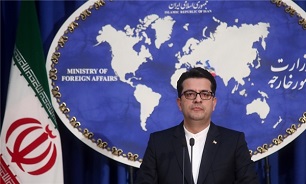Spokesman Condemns Biased Resolution of UNGA against Iran
 Late on Thursday after the UNGA 3rd Committee’s approval of a resolution of human rights against Iran, Mousavi blasted the move.
Late on Thursday after the UNGA 3rd Committee’s approval of a resolution of human rights against Iran, Mousavi blasted the move.
“The adoption of human rights resolution against Iran reflects double-standard and hypocrisy of its sponsor and accordingly, it lacks credibility and legitimacy,” he added.
Criminals of the current era, who are staunch supporters of the resolution, have spared no efforts in committing crimes against humanity, ranging from killing children to dismembering critics and exerting economic terrorism against the independent nations, Mousavi underlined.
The diplomat termed the approval of the resolution as “unilateral and unrealistic” and added, “This resolution is put forward against Iran at a time when one of the chief supporters of this resolution, i.e. US, is violating the most basic rights of over 83 million Iranian people specially women, children, the elderly and patients.”
Accordingly, Iran strongly condemns the instrumental and political use of human rights by Western countries against the independent nations.
“From the perspective of the Islamic Republic of Iran, Universal Periodic Review (UPR) mechanism of Human Rights Council is the proper mechanism for the evaluation of human rights in countries which review human rights in all countries without any discrimination,” he emphasized.
For Iran, observing human rights is the legitimate and religious requirements in line with national security and interests, Mousavi emphasized.
All five Central Asian countries (including Kazakhstan, Kyrgyzstan, Turkmenistan, Tajikistan and Uzbekistan) opposed the UN General Assembly’s human rights resolution against Iran and voted against the move unanimously.
Other countries such as Afghanistan, Armenia, Belarus, China, Iraq, Pakistan, Russia and Syria also opposed the resolution against Iran.
Totally, 66 countries gave abstention vote and 30 countries voted against the resolution.
Iran has always been critical of the Westerners’ instrumental use of international mechanisms and organizations like the UN and its subsidiary parts.
On Wednesday, Iranian Deputy Foreign Minister for Legal and International Affairs Gholam Hossein Dehqani had rapped the UN Security Council for adopting a double-standard approach towards different regional and international issues.
Dehqani made the remarks in Tehran in a meeting with Director-General for Multilateral Affairs of the Belgian Foreign Ministry Axel Kenes, whose country is a non-permanent member of the UN Security Council.
During the meeting, Dehqani criticized the UNSC for its Secretariat's reports on implementation of Resolution 2231 that has been released without showing any attention to the US repeated violations of the nuclear deal and the resolution, and stressed the need and importance of the opposition of the UNSC member states to the US unilateralism and instrumental use of the UN bodies.
He also referred to the UNSC's unilateral approach on issues like Yemen and its insufficient attention to the humanitarian dimensions of such crises, calling on Belgium as a non-permanent member of the UNSC to make more efforts to resolve them peacefully.
Resolution 2231 was a resolution endorsing the Joint Comprehensive Plan of Action (JCPOA) on the nuclear program of Iran. It sets out an inspection process and schedule while also preparing for the removal of United Nations sanctions against Iran.
Washington withdrew from the internationally-endorsed 2015 nuclear deal with Iran on May 2018, re-imposed the toughest-ever sanctions against the country and started a plan to zero down Tehran's oil sales.
Under the nuclear agreement reached between Iran and six world powers in July 2015, Tehran undertook to put limits on its nuclear program in exchange for the removal of nuclear-related sanctions.
Message end/
